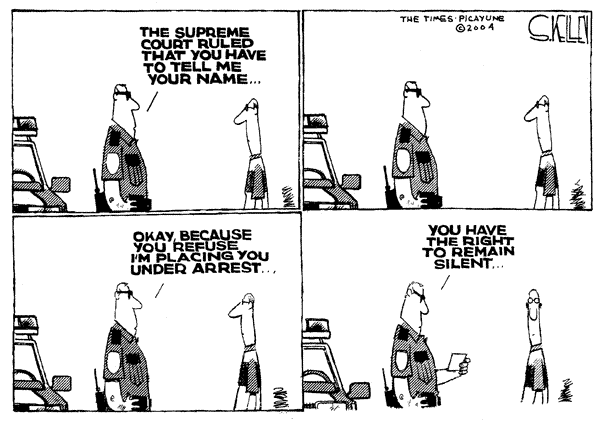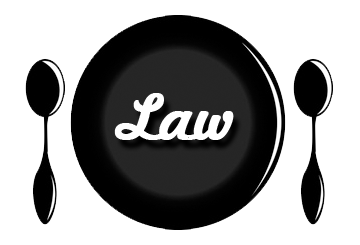"The more corrupt a nation the more numerous are it's laws." Tacitus 95 A.D.
"One may well ask: How can you advocate breaking some laws and obeying others? The answer lies in the fact that there are two types of laws: just and unjust. I would be the first to advocate obeying just laws. One has not only a legal but a moral responsibility to obey just laws. Conversely, one has a moral responsibility to disobey unjust laws." - Martin Luther King, Jr.
All Law comes through some form of authority.
All Law created by man exists within a fictional world, by the nature that all Law makes use of hearsay fiction to identify man or objects within the world as things. All worlds are fictional based and do not exist in reality, but are created to overlay the true reality we all experience with our five senses.
The State you live in isn't real, it's a construct of the mind. Someone came up with the idea to divide land, and name it. When you make use of any law other than your own law, you are by default acknowledging that you are a slave to authority, whose laws you are using to defend yourself with. Thus if you are accused within the world of breaking a law, then by whose law is it and how is it that you broke their law if you are not bound to follow their law to begin with? Of course, once you agree to be a part of a society, you are bound by it's rules. Legislative regulations and statutes are simply "rules" for a society that you have agreed to be a part of. When you agree to call yourself a U.S Citizen, you agree to be bound by FEDERAL laws. However, if you consider yourself a national, a non-resident alien, or a citizen of one of the states of the union (i.e, California State, not "STATE OF OF CALIFORNIA") you are not bound by these federal statutes.
You've seen codes, rules, regulations, statutes, ordinances, by-laws, policies, constitutions, legislations, treaties, acts, bills, and charters, but .. have you ever seen a "law"? They are distraction from the only law that can have authority over you, Common Law. The law of the land. Common law is essentially common sense. It sounds more like a lesson to a three year old when explained, but it's as easy as "Don't steal, cheat, lie, or harm another person, or their property and belongings". If you do, then someone can bring a claim against you. Only real people can bring claims against others. In many court cases you'll find that it is the Strawman (your artificial person), vs. "The State of California" (which is a federal branch of the U.S Government, not one of the states of the Union.)
"Inasmuch as every government is an artificial person, an abstraction, and a creature of the mind only, a government can interface only with other artificial persons. The imaginary, having neither actuality nor substance, is foreclosed from creating and attaining parity with the tangible. The legal manifestation of this is that no government, as well as any law, agency, aspect, court, etc. can concern itself with anything other than corporate, artificial persons and the contracts between them." - S.C.R. 1795, Penhallow v. Doane's Administraters (3 U.S. 54; 1 L.Ed. 57; 3 Dall. 54), Supreme Court of the United States 1795.

Question: How does the government pass what seems to be unconstitutional laws and get away with it in the courts?
The short answer is, they aren't. We've simply agreed to these laws as a matter of our Right to contract (consent) and that is why we are always being asked to sign up for things. Because, the truth is, there is no jurisdiction until after you sign on the dotted line.
It's called, "by the consent of the governed" and is otherwise known as "free enterprise" (Art I,10,1) and is what is referred to today as the "rule of law," which is nothing more than private contracts between us and the various levels of government. So you see, they aren't passing unconstitutional laws, we're just agreeing to them by our right to consent (contract) and that is what free men do. And once signed, the courts are there to see that all the parties to the contract honor it, according to the terms and conditions, not the Constitution or the Bill of Rights. Why? Because private contracts are actually superior to the Constitution itself, because the people already had the right to consent, long before the Constitution was written and in fact, the Constitution upholds this right by forbidding any state from passing any laws impairing the obligation of a contract (Art I, 10, 1).
Everything you sign is 100% voluntary, else you're not free, are you? This is how we, as free men, decide to live our lives as we see fit and so it is; every time we sign anything we are delegating our rights to the determination/authority of others and all the courts are doing is forcing us to honor the agreement.
Most people are unaware that there are two separate and distinct nations in our system of government. Is is your job to understand the differences between the two. The politicians and judges do not want this distinction to be clear, and in fact the majority of people in America today are part of the second system:
United States of America (the 50 several States) vs. United States (federal government + possessions and territories)
Republic (honors individual rights) vs. Democracy (majority rule)
Common Law (the Peoples Law) vs. Rule of Law (contracts - statutes, codes & regulations)
Citizen (the People of a State) vs. Resident (alien to the State)
Natural Rights (are absolute) vs. Immunities and privileges (can be regulated)
John Quincy, Jones (a natural / living person) vs. JOHN Q. JONES (an artificial / corporate entity)
Freeman vs. Political Subdivision (citizen of the United States)
CAUTION: Laws are written and meant to be understood literally, otherwise it is ambiguous and unenforceable. So take great care to KNOW what each and every word means, in the lawful sense, before you assume you understand any and all statutes, codes or regulations, not to mention the Organic Documents that either created or allowed them. For example, many words that you commonly use mean something else in legal terminology. It is called legalese.
I highly recommend you get a copy of Black's Law Dictionary, preferably the 6th edition or earlier. The latest edition (7) will get you by, put it has been much diluted of any historical reference where it counts.

The first order of law is Natural Law. These are Universal Principals which so necessarily agrees with nature and state of man, that without observing their inherent maxims, the peace and happiness of society can never be preserved. Knowledge of natural laws may be attained merely by the light of reason, from the facts of their essential agreeableness with the constitution of human nature. Natural Law exists regardless of whether it is enacted as positive law.
"Natural law and natural rights follow from the nature of man and the world. We have the right to defend ourselves and our property, because of the kind of animals that we are. True law derives from this right, not from the arbitrary power of the omnipotent state. Natural law is not some far away and long ago golden age myth imagined by Locke three hundred years ago, but a real and potent force in today's world, which still today forcibly constrains the lawless arrogance of government officials." James A. Donald
The Law of Commerce arose when humans began buying, trading, bartering, and selling goods and services. Today this law is universal, and codified in the Uniform Commercial Code or U.C.C. The Law of Commerce has been in operation since many thousands of years ago through the Sumerian/Babylonian era where it was codified and enforced. Ancient artifacts dating over 6,000 years old reveal that the system was so codified and enforced. Ancient artifacts dating over 6,000 old reveal that the system was so complex it even included receipts, coined money, shopping lists, manifestos and a postal system with the medium being in baked clay.
As a derivative of Commercial law, being removed from natural law, and therefore inferior, is Common law. The law of the land. Simply put, if you commit a breach of the peace, or employ mischief in your agreements, or cause harm or loss to anyone, then you are answerable to Common Law. Common Law procedures were based on the chance to "face your accuser" or the "injured party" in front of witnesses to sort out the problem directly. This process was NEVER intended to include lawyers, attorneys or judges construing their own law, as these "titles" are all based upon the fiction of "representation" which can never "be the real thing."
After Common Law comes governments, and their "laws" and legislative regulations. The only law central governments were supposed to create were to deal with commerce, to "allow commerce to flow more efficiently between the states." It was never intended to regulate people - the sovereigns.
One of our problems is that when we engage with government, municipalities and other such elements, we have been conditioned to interact on and in their level. Since government, and it's derivatives are simply "fiction", they cannot interact with a living man. Instead they can only interact with a fictitious entity, commomly called The Strawman, the All-Capital-Letter replica of your name. When you go to court, you, the living being, represent the fictious identity. It is simply a mistake you make when you assume that JOHN D. DOE is you. (Even the normal version of your name, John Doe, is not YOU. It is simply a name by which you are called. Thus, a name itself is also a fiction.) This is why it is important for a Judge to have you "state your name". You must agree to represent the NAME before the court can proceed.

The lowest kind of "law" is Statute Law, is not quite so straightforward and is often known by other names such as Admiralty, Fleet, Commercial or Civil Law and is referred to as the Law of the Sea. Most courts operating using this type of law.
Statute: A law enacted by the legislative branch of a government
An act of a corporation or its founder intended as a permanent rule
An international instrument setting up an agency and regulating its scope or authority
Put simply if you live peaceably, you will not violate Common Law. And you will not, therefore, end up in court charged with breaking Common Law. Consequently, if you end up in court, it will be because you violated a Statute. (And therefore you did not need to end up in court). So, in essence, if a peaceful person ever actually ends up in court, it was because they simply did not know their rights) A Statute is the final result of a Bill placed before Congress.
A Statute is a rule created by a representative governing body of a society designed to create common goals, which carries the force of law by the consent of the governed.
Courts and laws are either de facto, or de jure, and most courts today are de facto.
De Facto: "of fact" - reality as it is - often referred to as "legal" - the set of rules by which the martial dictator of the moment controls you, independent of his oath of office, jurisdictional restrictions, or the extant body of law.
De Jure: "of law" - reality as it was supposed to be - according to law, by right - often referred to as "lawful" - the set of rules, the body of "The Republic"
A
Summary of the Bill of Rights
- 1st
Amendment – Congress shall make no law respecting an establishment
of religion, or prohibiting the free exercise thereof; or abridging
the freedom of speech, or of the press; or the right of the people
peaceably to assemble, and to petition the Government for a redress
of grievances. 2nd Amendment – The right
of the people to keep and bear Arms shall not be infringed. 4th
Amendment – The right of the people to be secure in their persons,
houses, papers, and effects, against unreasonable searches and
seizures, shall no be violated, and no Warrants shall issue, but upon
probably cause, supported by Oath or affirmation, and particularly
describing the place to be searched, and the persons or things to be
seized. 5th Amendment – Protects people from being
detained for committing a crime unless they are properly indicted,
that they may not be tried twice for the same crime, that you need
not be forced to testify against yourself, and from property being
taken without just compensation. It also contains due process
guarantees. 6th Amendment – Guarantees the right to a
speedy trial, an impartial jury, that the accused can confront
witnesses against them, and that the accused must be allowed to have
a lawyer. 8th Amendment – Excessive bail shall not be
required, nor excessive fines imposed, nor cruel and unusual
punishments inflicted. 13th
Amendment – Neither slavery nor involuntary servitude, except as a
punishment for a crime whereof the party shall have been duly
convicted, shall exist within the United States, or any place subject
to their jurisdiction.
BY CONSENT OF THE GOVERENED!
That is a crucial thought. Are you the Government? No. Therefore you must be ‘the governed’. A Statute only carries the force of law upon you if you consent to it. If you do not give your consent, a Statute cannot affect you in any way whatsoever. And the courts know this. You may not, but they certainly do. And the last thing they will do is tell you. In point of fact they will hide this from you at every opportunity. On the other hand, if you tell them, they will accept it because they know it is actually true.

Does this mean that you can break the law with impunity? The careful answer to that is "No”, because that is a sloppy question. ‘The law’ is Common Law, and you can’t break that (without consequences). The question should have been "Does this mean you can violate a Statute with impunity?”. The answer to that is "Yes” because a Statute is not the law. It is, in reality, nothing more than Company Policy (as you will see). And, if you decide not to work for a particular company, its ‘policy’ does not in any way affect you. Think of it this way. You go to work for a Supermarket Chain. You will be given a handbook of company rules. While in their employ you must follow these rules or be sacked. For example, one such rule may be that - while working on Checkouts - you must not carry any of your own money about your person. This may be because it is impossible to tell money from money, and if you are caught in possession of money it might be the company’s money, out of the till. And the only way the truth could be determined is if you are barred from carrying your own money while operating the till. You either accept such rules, or don’t work for that company. But, if you don’t work for them, the rules don’t apply to you. You can carry your own money about your person at all times with impunity. You don’t expect to have to ask anyone if you can carry money, do you? During life, going about your peaceful business you don’t expect to be barred from carrying money. How else would you pay for anything? So how do you avoid such rules? Leave the company, ‘the society’. Work for some other company whose rules you can accept. OR BECOME ‘SELF-EMPLOYED’, and make your own ‘Company rules’! You can choose to leave the ‘Statute Society’, the ‘Statute Company’, and become ‘Self-employed’ - as a Freeman-on-the-land, a sovereign human being.
You can become Self-employed in terms of a ‘lawful, sovereign, peaceful human being entirely responsible for their own actions and not having to take any notice whatsoever of company policy issued as Statute by a nannying (and thoroughly, utterly corrupt) government, or pay any attention to the CEO (the President of the U.S), or Board of Directors (Congress). You have to understand that the U.S IS A CORPORATION. It is not the same as "The United States of America" or the States of the Union. This has been done in England, Canada, and many other countries as well. (And you can check this out by obtaining a Credit Report on it via Dun & Bradstreet.) This beast is EVERYWHERE!
Law:
noun
1. the principles and regulations established in a community by some authority and applicable to its people, whether in the form of legislation or of custom and policies recognized and enforced by judicial decision.
2. any written or positive rule or collection of rules prescribed under the authority of the state or nation, as by the people in its constitution. Compare bylaw, statute law.
3. the controlling influence of such rules; the condition of society brought about by their observance: maintaining law and order.
4. a system or collection of such rules.
5. the department of knowledge concerned with these rules; jurisprudence: to study law.
Origin: before 1000; Middle English law ( e ), lagh ( e ), Old English lagu < Old Norse *lagu, early plural of lag layer, stratum, a laying in order, fixed tune, (in collective sense) law; akin to lay and, lie.
Lets DEFINE LAG:
1. To fail to keep up a pace; straggle.
2. To proceed or develop with comparative slowness: The electric current lags behind the voltage.
3. To fail, weaken, or slacken gradually; flag.
A condition of slowness or retardation.
lag 3 (lg) Chiefly British Slang tr.v. lagged, lag·ging, lags
1. To arrest.
2. To send to prison.
Why is that part of the origin of the word LAW (lag) mean to to fail, weaken or slacken gradually, to arrest, and to send to prison? Is it possible that this is the only purpose of LAW? And why is the word law akin to the word LIE which means; something intended or serving to convey a false impression; a false statement with deliberate intent to deceive; an intentional untruth?
About
the United States CodeAdmiralty - An Overview















